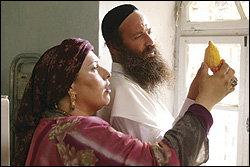It is with no small measure of relief that I contemplate a film from the Middle East with no reference to suicide bombers, the war in Iraq, or the Israeli-Palestinian conflict. The modern world has little place in Ushpizin, and that is by design. The two “ushpizin”—translated from Aramaic as “guests”—are a couple of secular Israelis who overstay their prison furlough. Eli (tall, dreadlocks) and Yossef (short, bald) are our contemporary benchmarks, strangers in an unfamiliar Orthodox Jewish world when they crash the Jerusalem home of rabbinical student Moshe (screenwriter Shuli Rand) just as he’s preparing for the Succoth holiday. Before the fugitives arrive, Moshe and his wife, Malli (Rand’s real-life spouse, Michal Bat-Sheva Rand), are broker than broke. When the landlord comes knocking for the rent, Malli freezes like a turtle within a turtle, quieter than quiet. They’ve chosen this life of penury and faith; then an unexpected gift of $1,000 from a religious charity allows them to honor the Succoth properly. It’s a miracle.
What is the Succoth? It commemorates the protection of the Jews expelled from Egypt, who were housed in dwellings called Succah, now re-created as symbolic boxy wooden shelters during that holiday. Moshe puts it this way to his old friend Eli: “So is this world: temporary, passing—we’re all just guests.” Inside, they also do a lot of feasting and drinking.
In a stroke of divine irony, Moshe and Malli are confronted with a pair of hard-partying, loud-mouthed unbelievers, and they are none too thrilled about the situation. God says the ushpizin are a blessing; to Moshe, they seem more like a plague. Or “a test” Malli suggests, even as Moshe’s temper begins to boil. (Eli knows something about Moshe’s old brawling days, calling his newfound piety “this whole act,” which provokes him further.)
Ushpizin has some script and cultural-translation limitations that can make the story hard to follow. It also has the virtue of a strangeness that’s both archaic and contemporary. Moshe and Malli make their relationship with God as natural and quotidian as brushing your teeth. The divine is a real and active presence in their lives. When childless Malli prays to God between drags on a cigarette, there’s the intimacy of a conversation on a park bench.
Since so much of the story takes place in the crowded stone alleys of old Jerusalem’s Orthodox quarters, it’s a shock when someone ventures outside where there are cars and Israelis in secular dress. Director Gidi Dar comes from that world, as did Rand before turning religious. Inside, of course, there are all the same failings of human nature: pettiness, anger, dishonesty, and—worst of all—doubt. Though an imperfect film, Ushpizin affectingly shows us people striving toward their own notions of perfection. (PG)








